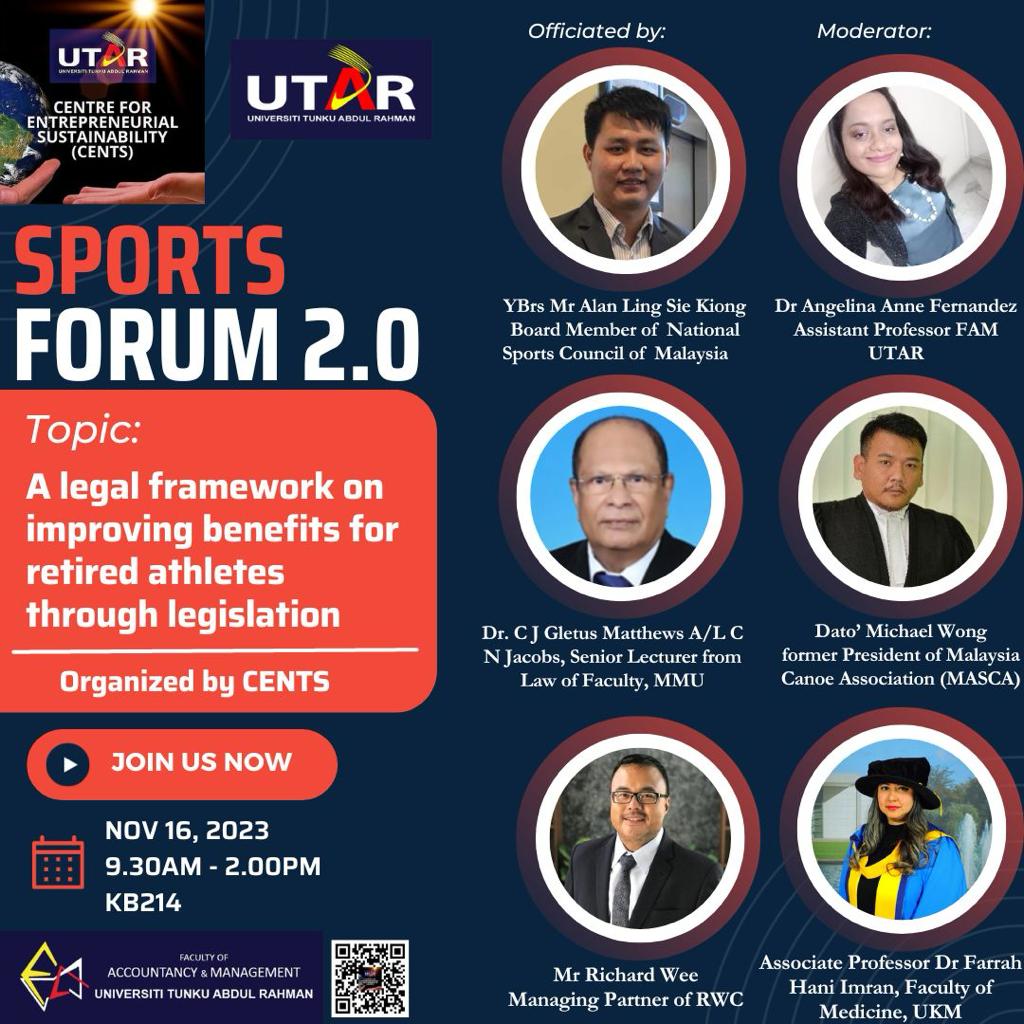

Third from left: YBhg Dato’ Michael Wong, Professor Dr Faidz, Professor Dato’
Dr Ewe and YBrs Mr Alan Ling with speakers, guests and participants
The forum was attended by National Sports Council of Malaysia Board Member Yang Berusaha Mr Alan Ling Sie Kiong, Ministry of National Unity Department of National Unity and Integration Deputy Director General (Planning) Yang Berusaha Mr Mohd Fardhi bin Mohamad, UTAR President Ir Prof Dato’ Dr Ewe Hong Tat, Vice President for R&D and Commercialisation Ir Prof Ts Dr Faidz bin Abdul Rahman, OCM Legal Advisory, Rules and Discipline Committee Chairperson Y.H. Dato’ Sri Dr Jahaberd een Mohamed Yunoos, Malaysia Canoe Association (MASCA) ex-President Yang Berbahagia Dato’ Michael Wong Meng San, Bank Simpanan Nasional (BSN) CEO En Jay Khairil Jeremy Abdullah, Badminton Association of Malaysia HR and Admin Department Mr Ravendran, Richard Wee Chambers Managing Partner Mr Richard Wee, Universiti Kebangsaan Malaysia Faculty of Medicine (Former national gymnast) Assoc Prof Dr Farrah Hani Imran, Multimedia University Faculty of Law senior lecturer Dr J. C J Gletus Matthews and CENTS Chairperson Prof Dato’ Dr Tai Shzee Yew. FAM lecturer Dr Angelina Anne Fernandez was the moderator.

YBrs Mr Alan Ling delivering his speech
YBrs Mr Alan Ling said, “I would like to invite private centres to enlarge the scope of their corporate social responsibility (CSR) programmes by including scopes such as looking after the former athletes. I believe that through today’s forum, the government will seriously study and improve a more comprehensive mechanism to protect the benefits of retired athletes. Their sacrifice and contribution should not be forgotten, but should always be respected and remembered.”

Professor Dato’ Dr Ewe delivering his speech
Professor Dato’ Dr Ewe said, “With the vision of providing holistic education, UTAR looks beyond developing students academically by providing them with other skills that enhance their contributions to the workplace and society. I am also delighted to share that UTAR has signed a memorandum of understanding (MoU) with the National Sports Council of Malaysia recently. Under the MoU, 10 athletes who have achieved excellent performance in the field of sports will be awarded scholarships to pursue their tertiary studies at UTAR.”

Professor Dato’ Dr Ewe (left) presenting a token of appreciation to
YBrs Mr Alan Ling


Professor Dato’ Dr Ewe (left) presenting a token of appreciation to YBhg Dato’ Michael Wong (left picture) and Dr J. C J Gletus Matthews (right picture)


Professor Dato' Dr Tai (left) presenting a token of appreciation to Dr Farrah Hani Imran (left picture) and Mr Richard Wee (right picture)

YBhg Dato’ Michael Wong
After the presentation of token of appreciation to YBrs Mr Alan Ling and the panellists, the forum officially started.
The first question addressed at the forum was “Is there any international law for retired athletes that can be adopted in Malaysia?”. In response, YBhg Dato’ Michael Wong said, “Initiating the Employees’ Provident Fund (EPF) and Social Security Organization (Socso) for retired athletes is crucial for ensuring their financial security post-retirement. Given that athletes often do not receive a fixed salary but rather allowances, it is imperative to establish a special allowance system tailored to their unique circumstances. Additionally, offering privileged access to medical treatment further recognises and addresses the distinct needs of athletes, promoting their well-being and acknowledging the sacrifices they make in the pursuit of excellence in sports.”

Mr Richard Wee
In addressing the question, “What careers can athletes pursue after retirement?”, Mr Richard Wee expressed, “We still have many athletes who are not medal winners like Dato’ Lee Chong Wei. They are driven by the desire to win competitions for the nation, and most of them invest their prime years in training and games but still struggle to secure victory. Consequently, they often cannot complete their degrees, hindering their entry into the workplace. Unfortunately, a significant number of senior athletes find themselves unemployed.”

Dr Farrah Hani Imran
In addressing the question of challenges faced by athletes after retiring, Dr Farrah highlighted several issues. She mentioned the difficulties of missing numerous classes due to training sessions, which cause educational limitations for the athletes. Obtaining scholarships for further studies have also become a challenging endeavour for them. Moreover, athletes often grapple with body image concerns as their physique changes, and they may face body shaming due to weight gain post-retirement. Financial struggles are another significant challenge, exacerbated by the lack of stable income after leaving the sporting arena. Additionally, the long-term effects of intense exercise contribute to physical damage, posing yet another hurdle for retired athletes.

Dr J. C J Gletus Matthews
Dr J. C J Gletus Matthews was asked to provide some suggestions to improve the retirement benefit of athletes in Malaysia, to which he answered, “In the UK, the support system for retired athletes is diverse and generally comprehensive, varying by the sports. UK Sports, the government body overseeing elite sports funding, provides extensive programmes for athlete career transition. These initiatives encompass access to education, skills development, and mental health resources.”

From left: Mr Richard Wee, YBhg Dato’ Michael Wong, Dr Angelina, Dr J. C J Gletus Matthews,
YBrs Mr Alan Ling and Dr Farrah Hani Imran

The poster
© 2023 UNIVERSITI TUNKU ABDUL RAHMAN DU012(A).
Wholly owned by UTAR Education Foundation (200201010564(578227-M)) LEGAL STATEMENT TERM OF USAGE PRIVACY NOTICE